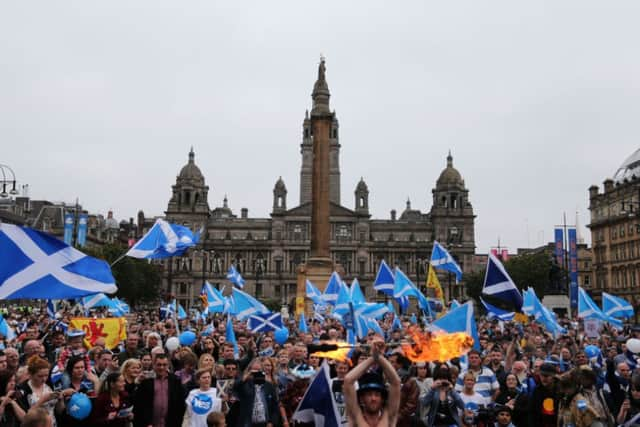Latest poll - No 53%, Yes 47%: Union on a knife edge


The Ipsos-Mori poll for the London Evening Standard found 53% of voters planned to vote No, while 47% said they would vote Yes, after excluding undecided voters.
About 4% of the 991 people questioned still had to make up their minds how to vote, according to the poll carried out on Tuesday and Wednesday.
Advertisement
Hide AdAdvertisement
Hide AdThe study echoes other recent opinion polls which gave the pro-unionists a narrow lead.


A YouGov survey for The Sun and The Times found 52% of Scots were to vote for the union with 48% favouring independence, when undecided voters were excluded.
The result was mirrored in a Panelbase survey which also found 52% of Scots backed the union compared with 48% for independence, again with undecided voters excluded.
A survey by Ipsos-Mori for the broadcaster STV suggested the gap could be even closer.
Advertisement
Hide AdAdvertisement
Hide AdIt found 51% of people were voting No, with 49% backing Yes, when undecided voters were excluded.
When those who were yet to make up their minds were factored in, the No campaign was on about 49%, Yes on 47% and 5% said they did not know how they would cast their ballot.
The latest YouGov result remained unchanged from the last poll conducted six days ago.
It excluded the “don’t knows” who made up 6% of the survey.
It said its research also suggested men were more likely to vote for independence by a margin of 54% to 46%, while women would prefer Scotland to remain in the UK by a margin of 57% to 43%.
Advertisement
Hide AdAdvertisement
Hide AdYouGov said the result was compiled after 3,237 electors were questioned between Monday and Wednesday.
The Panelbase survey came out less that 24 hours before voting got under way in the referendum and was another indication that the campaign over the future of the UK could go down to the wire.
Exactly half of the 1,004 people questioned said they would be voting No to independence, with 45% voting Yes.
Just one in 20 (5%) of voters still had to make up their mind, according to the research.
Advertisement
Hide AdAdvertisement
Hide AdIt added that men continued to be more likely to support Scotland leaving the UK, with about 54% said to be Yes voters, 44% who were voting No and 3% who were undecided.
Just under two-fifths (39%) of women questioned said they would be voting Yes, with 54% backing No and 7% still undecided.
Survation also released its final poll on the referendum, which suggested 53% of voters would support Scotland remaining in the union while 47% would vote Yes, when undecided electors are excluded.
When the 9% of those unsure how they were voting were included, the No campaign received 48% while Yes picked up 43%.
Advertisement
Hide AdAdvertisement
Hide AdThe poll for the Daily Record was conducted by telephone over a 24-hour period on Tuesday and Wednesday.
Survation said the poll reached 1,266 respondents but had an effective sample size of 1,089.
As voters prepared to have their say in Scotland, Deputy Prime Minister Nick Clegg said a No vote would force a radical rethink in the role of Scottish MPs south of the border.
The Liberal Democrat leader and Sheffield Hallam MP said it was “not logical” that Scottish MPs should be able to carry on voting on issues which affect only England if there is a further devolution of power from Westminster to Holyrood.
Advertisement
Hide AdAdvertisement
Hide AdHis comments come amid growing concern from Conservative MPs that promises of further devolution to Scotland risked disadvantaging England.
Mr Clegg, along with David Cameron and Ed Miliband, has signed a pledge to hand sweeping new powers to Scotland, if Scots vote to reject independence and remain part of the United Kingdom.
He made clear, however, that would have consequences for the way votes are organised in the House of Commons. “When the decision is made in the coming months and legislation is passed to give these new significant powers - on welfare, on borrowing, on tax raising - to Scotland that should be accompanied by a decision about how the votes are organised in Westminster,” he said on his weekly LBC radio phone-in. “Clearly, when you have that degree of devolution, saying that a Scottish MP has precisely the same say over matters in English as an English MP doesn’t make any sense,” he added.
Mr Clegg, however, rejected calls from some campaigners for the creation of a separate English parliament to deal with England-only legislation.“We don’t need just to create another talking shop for politicians, another institution, another English parliament, to solve this issue,” he said.
Advertisement
Hide AdAdvertisement
Hide AdThe call for devolution to England’s local decision makers is today made in The Yorkshire Post as City of York council leader James Alexander says the North needs its own Alex Salmond.
Writing in a personal capacity, he said devolution would have to come with a mergers of spending cut hit public services.
“Why can’t the region that staged the Tour de France reduce business rates to become more competitive? Why can’t we create bonds to pay for transport infrastructure? Why can’t we decide if we would like free prescriptions? Or to have no tuition fees?” he said.
The Church of Scotland’s most senior cleric has urged unionist and independence campaigners to join forces to build harmony in the wake of the vote.
The victors should host an event with the key figures from the opposing camp to work on a strategy for Scotland’s future, the Rt Rev John Chalmers said.